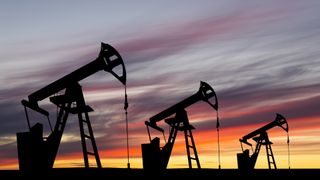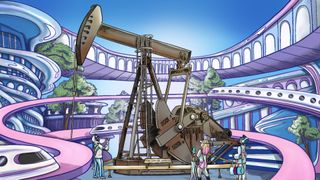How much oil is left and will we ever run out?
We may never run out of oil, though known reserves are expected to last for about 50 years, current estimates suggest.

For hundreds of millions of years, oil has been accumulating in reservoirs deep beneath our feet, built over the eons from the remains of animals and plants that sank into the Earth and were covered by layer upon layer of sand, silt and rock. Heat and pressure slowly transformed them into their liquid form.
Around 165 years ago, we started extracting this natural resource — for plastics, gasoline, asphalt and many other products — far faster than it could ever be replenished. At some point, then, it should run out. But how much is left, and when will it run out?
The short answer is the planet itself will never completely run out of oil, because some of the oil is in inaccessible places like Antarctica, and some may be made so deep inside Earth we can't even quantify it, let alone get to it.
But we do have a rough picture of the total.
"Broadly speaking, we know where most of the world's oil is," David MacDonald, professor emeritus of petroleum geology at the University of Aberdeen in the U.K., told Live Science.
That's because plate tectonics are largely responsible for where oil reservoirs ended up, and we have a fairly good understanding of these. Developing ocean basins create the right conditions for the rapid burial of plant and animal matter, while the movement of Earth's crust creates the heat and pressure that cooks that matter into oil. Subduction and rifting can produce the basins in which the oil can accumulate. As a result, oil fields are more likely to be found in some regions than in others.
Globally, around 1.6 trillion barrels of recoverable oil remain, according to a 2023 survey by Rystad Energy. There's also recoverable oil we haven't yet discovered; that's a hazier number, although in 2012, the U.S. Geological Survey put the estimate at 565 billion barrels.
Sign up for the Live Science daily newsletter now
Get the world’s most fascinating discoveries delivered straight to your inbox.
But when will humans use up this extractable oil? The answer to that is complicated.
For decades, industry experts have said there are around 50 years of oil left, based on known reserves.
Related: How do we turn oil into plastic?
This figure hasn't changed much because of how it is calculated: The number of years till oil runs out is equal to the current known reserves divided by the annual global demand. Our estimate of known reserves increased because we are always finding new fields, and the amount of time we have left didn't change much, because we're using up the new oil about as fast as we're finding it.
But at some point, this equilibrium will shift.
That's because the rate at which we can locate and extract oil is not static. As we find the easiest reserves to extract, options for new discoveries dwindle. Then, we develop new technologies that increase our ability to find new deposits.
Kevin Book, managing director of ClearView, a research firm based in Washington, D.C. that looks at energy trends, told Live Science he believes artificial intelligence will make it easier to find new reserves, and new recovery technology will make it easier to get it out of the ground in the coming years. That could increase our estimate of total recoverable oil reserves. "We expect a pretty significant future for oil," Book said.
And on the other side of the equation, demand for oil is likely to change in the coming years.
As the world moves away from oil as an energy source, thanks to the shift to electric vehicles, according to BP's 2023 Energy Outlook Report, demand will likely plateau. In October 2023, for instance, the International Energy Agency said it expects oil use to have peaked by 2030, declining after that.
That means we could have enough oil for far longer than the longstanding 50-year projection.
"The oil industry isn't going to collapse because we run out of oil, there's plenty of oil left," MacDonald said.

Hannah Osborne is the planet Earth and animals editor at Live Science. Prior to Live Science, she worked for several years at Newsweek as the science editor. Before this she was science editor at International Business Times U.K. Hannah holds a master's in journalism from Goldsmith's, University of London.
Most Popular



